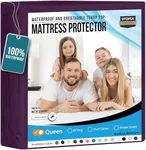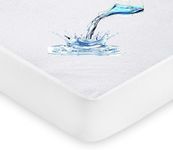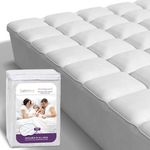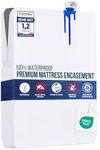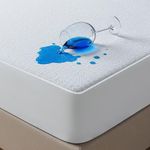Buying Guide for the Best Mattress Protectors
Choosing the right mattress protector is essential for maintaining the longevity and cleanliness of your mattress. A good mattress protector can shield your mattress from spills, allergens, and dust mites, ensuring a healthier sleeping environment. When selecting a mattress protector, consider your specific needs such as protection level, comfort, and any specific health concerns. Understanding the key specifications will help you make an informed decision that best suits your lifestyle and sleeping habits.MaterialThe material of a mattress protector is crucial as it affects comfort, breathability, and protection level. Common materials include cotton, polyester, and bamboo. Cotton is soft and breathable, making it ideal for those who prioritize comfort. Polyester is often more durable and water-resistant, suitable for those needing strong protection against spills. Bamboo is a great choice for those looking for a hypoallergenic and eco-friendly option. Consider your comfort preferences and any allergies when choosing the material.
WaterproofingWaterproofing is important if you want to protect your mattress from spills and stains. Mattress protectors can range from water-resistant to fully waterproof. A fully waterproof protector is ideal for families with young children or pets, or for those who enjoy eating or drinking in bed. If you don't anticipate many spills, a water-resistant protector might suffice, offering a balance between protection and breathability.
Fit and SizeEnsuring the right fit and size is essential for the protector to function properly. Mattress protectors come in various sizes such as twin, full, queen, and king. Additionally, consider the depth of your mattress; some protectors are designed for deeper mattresses. A snug fit prevents the protector from shifting during the night, ensuring consistent protection. Measure your mattress dimensions before purchasing to ensure a perfect fit.
BreathabilityBreathability refers to how well air can circulate through the mattress protector, affecting temperature regulation. A breathable protector is important for those who tend to sleep hot, as it helps maintain a comfortable sleeping temperature. Look for materials like cotton or bamboo, which are known for their breathability. If you live in a warmer climate or experience night sweats, prioritize breathability in your choice.
Hypoallergenic PropertiesHypoallergenic properties are important for individuals with allergies or asthma. A hypoallergenic mattress protector can help reduce exposure to dust mites, pet dander, and other allergens. Materials like bamboo and certain treated cottons are naturally hypoallergenic. If you suffer from allergies, look for protectors specifically labeled as hypoallergenic to ensure a healthier sleeping environment.
Noise LevelThe noise level of a mattress protector can affect your sleep quality. Some waterproof protectors can be noisy due to their plastic-like layers. If you are a light sleeper or easily disturbed by noise, look for protectors that are specifically designed to be quiet. Reading reviews or checking product descriptions for noise-related feedback can help you choose a quieter option.
Ease of CleaningEase of cleaning is a practical consideration, especially if you anticipate frequent spills or have allergies. Most mattress protectors are machine washable, but it's important to check the care instructions. Some may require special washing conditions or air drying. If convenience is a priority, opt for a protector that is easy to clean and maintain, ensuring it remains effective over time.



